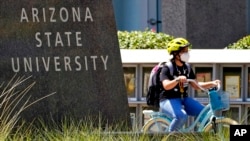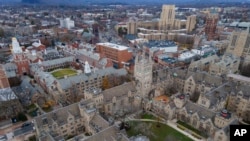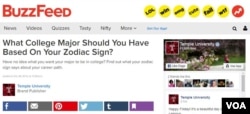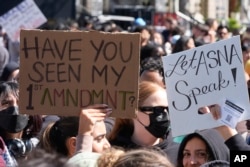Student Union
- By Pete Musto
Would You Go To This College If You Saw It On Buzzfeed?

In 2016, 86 percent of 18- to 29-year-olds in the United States used social media like Facebook, Instagram, Twitter and others, according to the Pew Research Center.
Stephen Loguidice, the vice president of brand development for Buzzfeed, says his company was one of the first to respond to changes in how young people react to information and advertising.
Loguidice explained that new, online media takes a different approach to advertising to the youth market.
“With social, now [companies] have to think about, ‘How do I say what they want to hear and not necessarily what I want to say?’
"And at the end of the day, now [companies are] competing with friends and family and co-workers and trusted news sources and all these other things.”
Studies show that younger people rely on the opinions and shares of their friends and family on social media more than traditional approaches. A recent study showed that youths say that nearly half of news on social is fake.
Buzzfeed studies its most popular content and creates advertising in the same style for clients like universities. For example, the online music service Spotify paid Buzzfeed for a branded marketing campaign in 2014. Buzzfeed created a story for them with the headline “15 Of The Best Bands To Come From College Campuses.”
Temple University in Philadelphia, Pennsylvania, was one of the first universities to partner with Buzzfeed in 2015. The website created an advertising campaign for the university that received almost 800,000 views online.
Shortly after, schools like Indiana University and the University of Wyoming began working with Buzzfeed. Chad Baldwin, vice president of communications at the University of Wyoming in Laramie, said his school paid Buzzfeed $100,000 in 2016 for two campaigns.
He admits this can be costly and says the school still send brochures and information through the mail. But UW is very happy with the Buzzfeed material, which has been viewed over 100,000 times, he says.
“There are a lot of the traditional things we still use,” Baldwin said. But “the social media element is huge and anyone who resists engaging in those [ways] is probably going to get left behind.”
Jay Baer is the creator of Convince & Convert, a marketing company that deals mostly with social media. (He is also a parent of a high school student choosing a college.) Baer says many media companies create this type of branded advertising, including large newspapers like the New York Times, for clients.
Universities should have considered this method of advertising much sooner, he says.
Jennifer Cronin is a professor of marketing and social media in the Mendoza School of Business at the University of Notre Dame in South Bend, Indiana. She cautions schools to be careful about losing the public's trust if the online material is considered offensive or untrustworthy.
“Colleges are supposed to be very elite and [centered] on academics, Cronin said. “And so, when you use these other [methods], if you do it poorly then there is the chance that you could harm your reputation.”
What do you think is the best way for universities to share their message with the current generation of young people? Should colleges use marketing like Buzzfeed?
Please leave a comment here, and visit us on Facebook, Twitter, Instagram and LinkedIn, thanks!
See all News Updates of the Day
- By VOA News
15 cheapest US universities for international students

Yahoo!Finance has compiled a list of the 15 cheapest U.S. universities for international students.
Among them: Arizona State University, the University of North Carolina at Chapel Hill and Michigan State University.
Read the list here. (March 2024)
- By VOA News
Studying STEM? International students have funding options

US News & World Report takes a look at funding options for international students pursuing STEM degrees in the U.S.
The article explains the different kinds of scholarships and grants and offers tips on getting part-time jobs and private student loans. Read the full story here. (March 2024)
- By Robin Guess
US campuses are battlegrounds in free speech debate

This week the University of Southern California canceled the graduation speech of its senior class valedictorian at a time when there is a growing debate over the limits of free speech on American college campuses.
USC’s Asna Tabassum, a Muslim biomedical engineer major, was selected from among 100 outstanding students to address the graduating class of 2024 this May. However, the school withdrew the invitation for her to speak at the graduation ceremony citing safety concerns.
Tabassum denounced the decision, which she attributed to her public support for Palestinian human rights. She said it is part of “a campaign of hate meant to silence my voice.”
The school maintains it is a safety issue, not about free speech. School officials say they received an alarming number of violent threats after selecting her as speaker.
USC is one of many American universities that have struggled with policies over free speech and campus protest since October’s Hamas terrorist attack on Israel and the continuing fighting in Gaza. After weeks or months of on-campus protests and rallies, schools have been taking more forceful action to punish protesters who administrators say have become disruptive.
On Thursday at Columbia University in New York, police arrested more than 100 students who had gathered on campus for pro-Palestinian protests. The school’s dean wrote that the protesters had been told several times that they were violating university policies and would be suspended. The students say they were exercising their free speech rights.
At Washington’s American University, protests in all campus buildings have been banned by the school’s president since January. Under the new policy, students may not hold rallies, engage in silent protests or place posters in any campus building.
Protests and safety
University students have a long history of engaging in political activism. From the Vietnam War to abortion rights, universities have played a key role in American political debates.
However, students now say that schools like AU with a long-standing protest culture are silencing protesters with new rules.
Arusa Islam, American University student body president-elect and current vice president, says the policies are preventing an open discussion about U.S. foreign policy.
“Indoor protesting was never a problem, it was never an issue before October 7th,” Islam said. “Students were allowed to put up posters in buildings and students were allowed to have a silent protest.”
“And now we don’t have that right anymore,” she added. “We have been silenced and it is affecting us greatly.”
American University’s president, Sylvia Burwell, says the school’s new policies are intended to ensure that protests do not disrupt university activity.
Burwell also referred to recent events on campus that “made Jewish students feel unsafe and unwelcome.” She added, antisemitism is abhorrent, wrong, and will not be tolerated at American University.
While administrators insist that they are making narrow restrictions in the interests of providing an education, critics say the policies have a far-reaching effect.
At Cornell University, where new rules took effect in January, Claire Ting, the executive vice president of the Cornell Student Assembly, said the policies have had an unsettling effect on campus.
“The campus climate at Cornell has been tense surrounding free speech in recent times,” Ting emailed VOA.
Ting said that both students and faculty feel the policy has had chilling effects on free expression.
“Students report facing arbitrary, escalating punishment for violating the policy, with the policy itself lacking clear outlines for the consequences of civil disobedience,” she added.
In its new policy Cornell warns students that disciplinary action may be taken if protests impede people or traffic, damage school property or interfere with the school’s operations in any way.
In its campus-wide notice explaining the new guidelines, the school wrote that the new policy would ensure that expressive activity is allowed but must remain nonviolent.
The Foundation for Individual Rights in Education, also known as FIRE, has tracked free speech issues on American campuses.
FIRE and College Pulse have produced an annual survey, since 2022, ranking colleges based on their policies and what students say about the free speech climate on campus.
This year the group reported that “alarming” numbers of students say they self-censor or “find their administrations unclear” on free speech issues.
“College campuses have always been places where students have been unafraid to express themselves and with the recent Gaza conflict after the 10/7 attacks, it’s been very heated on both sides of this issue,” said Zach Greenberg, the senior program officer of FIRE.
Harvard ranked last in this year’s survey. FIRE said the school punished some professors and researchers over what they had said or written, and students reported a poor climate for free speech on campus.
The controversy came to Congress late last year, when Harvard’s president testified over complaints of widespread antisemitism.
“I don’t think you’d find many students on campus right now that would say we are the model for flourishing free speech and ideas exchange in the country,” said J. Sellers Hill, president of Harvard’s school newspaper The Harvard Crimson.
“But I think you’ve really seen that be acknowledged by administrators and it seems to be something they are dedicated to taking on.”
As the head of The Harvard Crimson, Hill manages the paper’s 350 editors and 90 reporters, who’ve covered, in detail, the ongoing free speech/protests controversy and the resignation of former President Claudine Gay following her testimony to Congress.
“I think no one would dispute Harvard has work to do and progress to make,” Hill said. “I think it’s a tough sell, for me, that Harvard is uniquely in its own league in terms of intolerance of speech. That doesn’t square with what I have seen on our college campus or on other college campuses around the country. I think Harvard is held to a higher standard.”
Proposed settlement offered over financial aid allegations

A group of U.S. colleges and universities have agreed to settle a lawsuit alleging deceptive financial aid tactics, according to a report published in The Hill.
The schools would pay $284 million to plaintiffs who were enrolled full-time and received financial aid between 2003 and 2024.
The schools have denied the allegations. (April 2024)
Universities in Middle East building research relationships with China

As China bolsters research relationships with universities in the Middle East, the United States has taken notice – especially when that research involves artificial intelligence.
Reporting for University World News, Yojana Sharma has the story. (March 2024)












